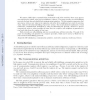Free Online Productivity Tools
i2Speak
i2Symbol
i2OCR
iTex2Img
iWeb2Print
iWeb2Shot
i2Type
iPdf2Split
iPdf2Merge
i2Bopomofo
i2Arabic
i2Style
i2Image
i2PDF
iLatex2Rtf
Sci2ools
135
click to vote
OPODIS
2000
2000
Fair and Reliable Self-stabilizing Communication
We assume a link-register communication model under read/write atomicity, where every process can read from but cannot write into its neighbours' registers. The paper presents two self-stabilizing protocols for basic fair and reliable link communication primitives. The rst primitive guarantees that any process writes a new value in its register(s) only after all its neighbours have read the previous value, whatever the initial scheduling of processes' actions. The second primitive implements a weak rendezvous communication mechanism by using an alternating bit protocol: whenever a process consecutively writes n values (possibly the same ones) in a register, each neighbour is guaranteed to read each value from the register at least once. Both protocols are self-stabilizing and run in asynchronous arbitrary networks. The goal of the paper is in handling each primitive by a separate procedure, which can be used as a black box in more involved self-stabilizing protocols.
Link-register Communication Model | OPODIS 2000 | OPODIS 2007 | Rst Primitive Guarantees | Self-stabilizing Protocols |
Related Content
| Added | 01 Nov 2010 |
| Updated | 01 Nov 2010 |
| Type | Conference |
| Year | 2000 |
| Where | OPODIS |
| Authors | Ivan Lavallée, Christian Lavault, Colette Johnen |
Comments (0)

